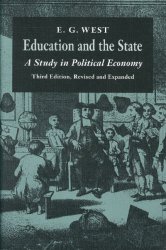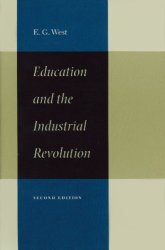Re-reading E. G. West’s classic Education and the State, which plunges into the current and historical debates over private and government education.

Suppose, for the sake of argument, that we grant that the government has obligation to protect children and that growing up ignorant is one of the things the government should protect children against. What policy follows from that?
West gives us a range of options. The government could:
1. Make education compulsory.
2. Make schooling compulsory, whether provided by private or government schools.
3. Make government schooling compulsory.
In our current intellectual context, we sometimes assume quickly that if the government has an obligation with respect to children’s education then it must itself provide that education.
West then introduces an intriguing analogy — to how we handle driver’s education.
Suppose we grant that the government has an obligation to protect drivers, so it should ensure that all drivers are knowledgeable and skilled. Perhaps it will issue licenses certifying those who have demonstrated enough knowledge and skill.
But how should drivers acquire the necessary skills? Does it follow that:
3. The government should operate driving schools in every locality, or mandate courses in driving within existing government schools?
2. Mandate that driver-candidates must take formal driving lessons, whether provided by private driving schools or government ones?
Or:
1. Leave it up to the driver-candidate to acquire the knowledge and skills however he or she chooses: by taking formal lessons, by being taught by mom or dad, by starting with tractors on the farm or simulations in video games, or by any number of other methods?

Can we say, as a matter of moral or political principle, which of options 1-3 is preferable? Can we say, as a matter of empirical data, which of options 1-3 will be more effective at producing knowledgeable and skilled drivers?
Source: E. G. West, Education and the State (1965; third edition 1994), p. 10.
I also recommend West’s Education and the Industrial Revolution (1975/2001), which argues that the revolution in manufacturing and the push for universal literacy and other forms of education were of a piece culturally in England, Scotland, and Wales from 1760-1840.
Related: My course lecture series on education theory: Idealism, Realism, Pragmatism, Behaviorism, Existentialism, Objectivism, Marxism, Postmodernism, and more.
I’m not sure I’m seeing the analogy completely here.
If you don’t pass your tests for a driver’s license, you don’t get to drive on government owned roads (legally). If you don’t pass your “education test,” then what? You don’t get to use government services? Don’t get to blog? Don’t get to call yourself a philosopher? Or what?
So driving is choice 1 (or a combo of 1 and 2), but education is between 0 and 1. You can keep your child at home and supposedly teach him or her, and then he or she can stop at age 16 and be mostly uneducated. Yes, you can also go to private or government provided school if you choose, and yes, your taxes pay for the public ones regardless, but that’s true of folks without children as well.
I guess I’m not grasping what you’re trying to say here.
Voting (or maybe holding public office) is the obvious analog to driving on public roads, here. But we probably shouldn’t trust governments with making voter qualification tests, as they might end up being tests of agreement with whatever partisans wrote the test.